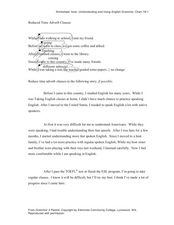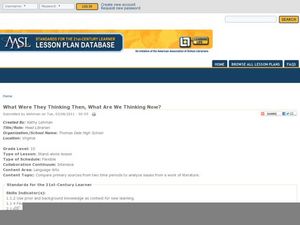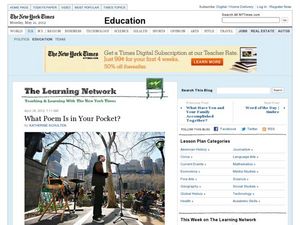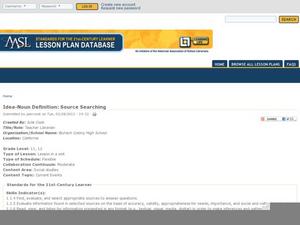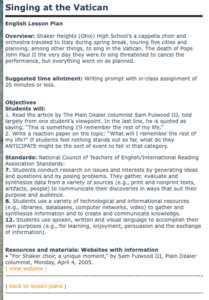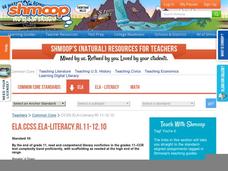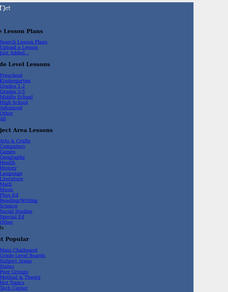Curated OER
Treasure Hunters
High schoolers design an on campus treasure hunt to find various architectural vocabulary words which they then create definitions for on the blog page on the Environmental Design website.
Curated OER
Reduced Time Adverb Clauses
Looking for a way to improve your students' writing conventions? Include this adverb clauses worksheet in your next grammar lesson. Middle and high schoolers read a three-paragraph selection and rewrite adverb time clauses to make the...
Curated OER
What Were They Thinking Then, What Are We Thinking Now?
Choosing an issue from a play or novel, researchers find two primary sources from different time periods to compare how people's views have changed. Many questions are listed to guide young writers. In the end, learners produce a...
Curated OER
How to Locate and Evaluate Information, Part III - Internet Sites
This is the third in a series of lessons scaffolding the research paper. It purports to teach researchers how to evaluate internet sites, but the lack of links, specific criteria, or site evaluation rubrics would require additional...
Curated OER
Poem in Your Pocket Day: Ideas for Celebrating
First instituted in New York City in 2002 and recognized nationwide in 2009, "Poem in Your Pocket Day" is part of National Poetry Month (April) and celebrates poetry in everyday life. A brief news story includes 9 ideas about how to...
Curated OER
Idea-Noun Definition: Source Searching
A great idea for showing language arts pupils the universality of themes, even in the real world! Have class members choose an idea-noun (peace, justice, war, love, etc.) at the beginning of the year or semester. They complete weekly...
Curated OER
Cause and Effect Worksheet 2
Why does Scout fear Boo? Why does George kill Lennie? Whether in literature or life, helping young learners recognize the relationship between actions and consequences is an important lesson. Have your class match twelve observable...
Curated OER
Sentence Fragments
Tired of finding sentence fragments in your students' writing? Use this straightforward activity to help them identify when a sentence is not complete. Sixteen sentences prompt learners to rewrite fragments as parts of a complete...
Curated OER
Beauty Queen Heads to Iraq
Students study about Jessica Gaulke, a beauty queen from Minnesota. She is then deployed to Iraq with the National Guard unit she is in. They have to role play her and react to what they think they would feel if they were in her shoes.
Curated OER
Hunger Games Fan Mania
"I'm just going to cry!" One fan said while waiting to meet The Hunger Games cast. Read an article with your class about the mobs that waited for a chance to meet the cast of the movie sweeping the country by storm. Read this article...
Curated OER
Reading Comprehension 3: Level 9
A statistics-loaded passage about home sales provides the text for a reading comprehension exercise. Although the subject matter might challenge some readers, the answer key explains how to approach and answer the three multiple choice...
Curated OER
Columbine Tapes: The Media's Right To Know
Learners research the Columbine tragedy. They read about the media role of watchdog on the government. Students discuss and debate how the media has been involved in the latest release of Columbine videos and other material.
Curated OER
Singing at the Vatican
Young scholars read article by The Plain Dealer columnist Sam Fulwood III, told largely from one student's viewpoint, and write reaction paper on topic: "What will I remember the rest of my life?"
Shmoop
ELA.CCSS.ELA-Literacy.RI.11-12.10
Assess whether your class members can comprehend complex informational text with a series of drills based on selections from Emerson, Thoreau, and G.K. Chesterton. The exercises could also be used for group work or a full-class discussion.
Curated OER
Create a Holiday
Students create their own holidays, describing them in booklet form. They develop the holiday's name, symbol, colors, food, and historical significance.
Curated OER
Writing Children's Literature
Students examine the common themes and characteristics of children's literature. They develop a list of characteristics, read and discuss examples of children's literature, and create an original children's book.



